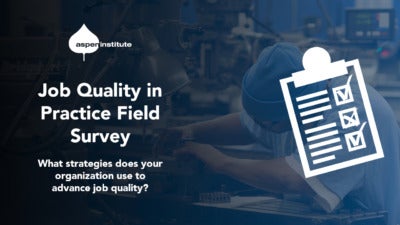Resource Roundup
Algorithmic Management
Subscribe to Our Newsletter
Resource Roundup, by the Economic Opportunities Program, is an editorial take on the latest articles and reports that shape our thinking on economic opportunity.

Maxwell Johnson
Research Associate
While some workers worry that artificial intelligence might spell their replacement, others have found that technology has become their boss.
An increasing number of workers receive their schedules from, and have their productivity rated by, data-driven technologies. The practice is known as algorithmic management, and it is especially prevalent in the gig economy, service work, and logistics industries. Some employers go so far as to use these technologies to surveil employees on the job and punish them for failing to meet standards that are often unclear — all with little human oversight or right to appeal. Left unchecked, algorithmic management threatens to drive the labor of millions of workers into a machine-like rhythm that erodes worker autonomy, mental well-being, and fair treatment on the job.
In this month’s Resource Roundup, hear from gig workers about how app-based platforms underpay workers and lock them into a confusing system in which workers have little leverage. In addition, read new research from the Roosevelt Institute on the rise of gig work in health care. Then, explore the policy framework proposed by the Labor Center at UC Berkeley for prioritizing workers’ rights as algorithmic management practices spread. We conclude with an essay in OnLabor on how algorithmic management contributes to workplace fissuring.
Human Rights Watch
The Gig Trap: Algorithmic, Wage and Labor Exploitation in Platform Work in the US
App-based gig companies, such as Uber and DoorDash, like to argue that they allow their drivers to be their own bosses. In reality, gig workers’ time on the clock is governed by opaque algorithms that set pay rates, allocate tasks, closely monitor performance, and rank employees — even kicking them off the platforms with little explanation or recourse. Workers’ independent contractor status further reduces their power to improve working conditions through collective action.
Read Human Rights Watch’s report on the working conditions of the gig workforce and what should be done to improve their economic well-being.
Roosevelt Institute
Uber for Nursing: How an AI-Powered Gig Model Is Threatening Health Care
The gig economy has made inroads into the health care system, and medical facilities have begun using platforms that match workers, often classified as self-employed, with available shifts. Similar to ride-sharing and other gig platforms, an algorithm determines pay and tracks an arbitrary set of performance metrics that affect compensation. Nurses have reported that their pay has been eaten away by costs imposed by the platforms, and, unlike traditional staffing companies, gig nurses don’t receive many of the protections of labor law.
Learn about the experience of gig healthcare workers in new research from the Roosevelt Institute.
UC Berkeley Labor Center
Data and Algorithms at Work: The Case for Worker Technology Rights
The development and implementation of algorithmic management in the workplace often occurs without worker input. Researchers at UC Berkeley evaluated the ways that new data-driven technologies are defining the modern workplace and have laid out the case for policies that protect workers from potential harm.
Read the full report here.
OnLabor
Watchful AI: Artificial Intelligence and Job Quality in the Fissured Workplace
Algorithmic management may increase a phenomenon that economist David Weil calls “workplace fissuring,” with companies subcontracting out their labor force while maintaining control over them. And while autonomous, data-driven management systems intensify the pace of work, workers hired as independent contractors or spread among subcontractors lack the same rights, benefits, and capacity to collectively bargain as direct employees.
Read Samantha Schwartz’s essay in OnLabor for more on how algorithmic management is changing work — and the need for labor law to catch up.
About the Economic Opportunities Program
The Aspen Institute Economic Opportunities Program advances strategies, policies, and ideas to help low- and moderate-income people thrive in a changing economy.
Join Our Mailing List
To receive occasional emails about our work — including new publications, commentary, events, fellowships, and more — join our mailing list.
Connect on Social Media
For news and updates every day, connect with us on the social media platform of your choice.







